試す 金 - 無料
Seeing With Their Ears
Australian Geographic Magazine
|September-October 2018
The tiniest bat and mightiest toothed whale navigate and hunt in darkness using echolocation. Even some humans have this remarkable skill.

DEEP IN THE ABANDONED mine shaft, bats were on the move. It was dusk – time for insect hunting. At the mine entrance, Kyle Armstrong knew they were coming because his bat detector device was picking up their ultrasonic echolocation calls, normally inaudible to the human ear.
It was the late 1990s. Kyle was working on his zoology doctorate at the University of Western Australia and wanted to catch some bats to collect non-lethal biopsy samples for a genetic study. The species he was focusing on was the orange leaf-nosed bat; the mine was at Bamboo Creek, in the East Pilbara, in northern WA. He’d set up a fine-mesh mist net across the entrance and was confident he’d catch a few.
The bats arrived from the depths – but refused to fly into the net. Detecting the filmy material in front of them, they spun around, tried again and spun around again. “They did this for some minutes, backwards and forwards, and then they discovered a pre-existing tear in my net, and in the blink of an eye they all zipped out through the hole and were gone,” Kyle tells me.
The experience left a lasting impression. “It brought home to me how clever bats are at processing their ultrasonic echolocation signals at high speed and finding out about their environment, even something as fine as a mist net,” he says.
For Kyle, it led to a career-long fascination with bats, their echolocation abilities and calls, particularly as a tool for identifying species. It’s all part of a branch of science known as bioacoustics. “I’m interested in bat echolocation because it underpins so much of their ecology and evolution,” he says. “You can see bats as similar to rodents, with two extra layers of complexity: they fly and they echolocate.”

このストーリーは、Australian Geographic Magazine の September-October 2018 版からのものです。
Magzter GOLD を購読すると、厳選された何千ものプレミアム記事や、10,000 以上の雑誌や新聞にアクセスできます。
すでに購読者ですか? サインイン
Australian Geographic Magazine からのその他のストーリー

Australian Geographic Magazine
SULAWESI SENSATIONS
There are worlds within worlds and marvels untold waiting to be experienced on Indonesia's remote islands.
9 mins
September-October 2024
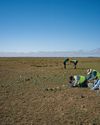
Australian Geographic Magazine
SEARCHING FOR AUSSIE DINOSAURS
Our understanding of where to find ancient life in Australia has been turned on its head by a new appreciation of the country's geology. Now the world is looking to our vast outback as the latest hotspot to locate fossils.
18 mins
September-October 2024
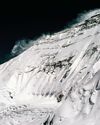
Australian Geographic Magazine
THE HARDEST NIGHT
The first Australian ascent of Mt Everest in 1984 is one of the great feats of mountaineering. Climbed by a small team semi-alpine style, with no bottled oxygen, via the Great (Norton) Couloir, it remains unrepeated 40 years later.
14 mins
September-October 2024
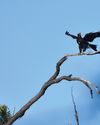
Australian Geographic Magazine
WEDGE-TAILED WONDER
The chance discovery of an eagle nest leads to an extended vigil observing normally hidden behaviours of one of nature's supreme winged marvels.
3 mins
September-October 2024
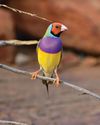
Australian Geographic Magazine
BURDENED BY BEAUTY
Northern Australia's Gouldian finch survives in huge numbers in cages around the world, but its wild population continues to struggle.
4 mins
September-October 2024
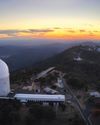
Australian Geographic Magazine
A TELESCOPE FOR A GOLDEN AGE
After a stellar 50 years as one of the country's major scientific assets, the AAT continues to play a major role in keeping Australian astronomy on the world stage.
7 mins
September-October 2024
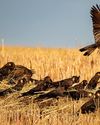
Australian Geographic Magazine
COCKY WHISPERING AT COOMALLO CREEK
This patch of remnant bush on the edge of the West Australian wheatbelt is a place loved by one of Australia's rarest bird species and the man who has studied the site for more than 50 years.
6 mins
September-October 2024

Australian Geographic Magazine
A PIONEERING PAIR
Louisa Atkinson and her mother, Charlotte, were among Australia's earliest authors, and pioneers in women's rights.
9 mins
September-October 2024

Australian Geographic Magazine
THE LONGEST WALK
Lucy Barnard is walking from Argentina to Alaska -the length of the Americas - on an extraordinary journey of endurance and adventure.
6 mins
September-October 2024
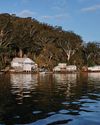
Australian Geographic Magazine
SECLUDED, BUT NOT ALONE
In an era of heightened social isolation, where many of us lead lonely lives, Dangar Island offers the chance to be part of a supportive, connected community.
7 mins
September-October 2024
Translate
Change font size
